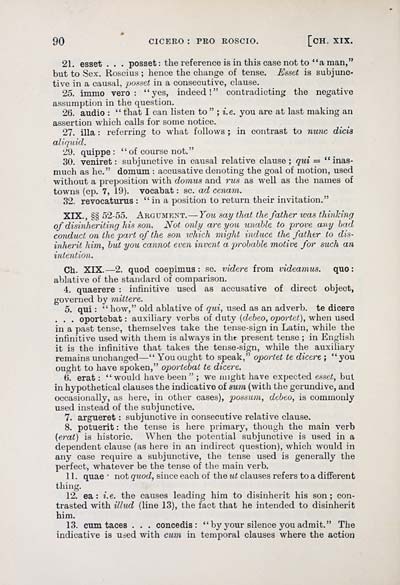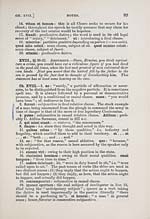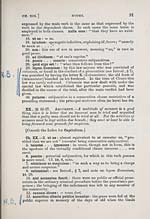Download files
Complete book:
Individual page:
Thumbnail gallery: Grid view | List view

90 CICERO : PRO ROSCIO. [CH. XIX.
21. esset . . . posset : the referenee is in this case not to "a man,"
but to Sex. Roscius ; hence the change of tense. Esset is subjiino-
tive in a causal, posset in a consecutive, clause.
25. immo vero : "yes, indeed!" contradieting the negative
assuniption in the question.
26. audio : " that I can listen to" ; i.e. you are at last making an
assertion which calls for some notice.
27. illa : referring to what follows ; in contrast to nunc dicia
aliquid.
29. quippe : "of course not."
30. veniret : subjunctive in eausal relative clause ; qui = " inas-
much as he. " domum : aceusative denoting the goal of motion, used
without a preposition with domus and rus as well as the names of
towns (cp. 7, 19). vocabat : sc. ad cenam.
32. revocaturus : " in a position to return their invitation."
XIX., §§ 52-55. Argument. — You say that thefather was thinJcing
of disinheriting his son. Not only are you unable to prove any had
conduct cm, the part of the son tvhich might induce the father to dis-
inherit him, but you cannot even invent a probable motive for such an
intention.
Ch. XIX. — 2. quod coepimus : sc. videre from videamus. quo:
ablative of the standard of coniparison.
4. quaerere : infinitive used as aceusative of direct object,
governed by mittere.
5. qui : " liow," old ablative of qui, used as an adverb. te dicere
. . . oportebat : auxiliary verbs of duty (debeo, oportet), when used
in a past tense, themselves take the tense-sign in Latin, while the
infinitive used with them is always in thr present tense ; in English
it is the infinitive that takes the tense-sign, while the auxiliary
remains unchanged — " You ought to speak," oportet te dicere ; "you
ought to have spoken," aportebat te dicere.
6. erat : " would have been " ; we luight have expected esset, but
in hypothetical clauses the indicative of 8um (with the gerundive, and
occasionally, as here, in other cases), possum, debeo, is commouly
used instead of the subjunctive.
7. argueret : subjunctive in consecutive relative clause.
8. potuerit : the tense is here primary, though the main verb
(erat) is historic. When the potential subjunctive is used in a
dependent clause (as here in an indirect question), which would in
any case require a subjunctive, the tense used is generally the
perfect, whatever be the tense of the main verb.
11. quae ■ not quod, since each of the xd clauses refers to a different
thing.
12. ea : i.e. the causes leading him to disinherit his son ; eon-
trasted with illud (line 13), the fact that he intended to disinherit
him.
13. ctim taces . . . concedis : "by your silence youadmit." The
indicative is Used with cwm iu temporal clauses where the action
21. esset . . . posset : the referenee is in this case not to "a man,"
but to Sex. Roscius ; hence the change of tense. Esset is subjiino-
tive in a causal, posset in a consecutive, clause.
25. immo vero : "yes, indeed!" contradieting the negative
assuniption in the question.
26. audio : " that I can listen to" ; i.e. you are at last making an
assertion which calls for some notice.
27. illa : referring to what follows ; in contrast to nunc dicia
aliquid.
29. quippe : "of course not."
30. veniret : subjunctive in eausal relative clause ; qui = " inas-
much as he. " domum : aceusative denoting the goal of motion, used
without a preposition with domus and rus as well as the names of
towns (cp. 7, 19). vocabat : sc. ad cenam.
32. revocaturus : " in a position to return their invitation."
XIX., §§ 52-55. Argument. — You say that thefather was thinJcing
of disinheriting his son. Not only are you unable to prove any had
conduct cm, the part of the son tvhich might induce the father to dis-
inherit him, but you cannot even invent a probable motive for such an
intention.
Ch. XIX. — 2. quod coepimus : sc. videre from videamus. quo:
ablative of the standard of coniparison.
4. quaerere : infinitive used as aceusative of direct object,
governed by mittere.
5. qui : " liow," old ablative of qui, used as an adverb. te dicere
. . . oportebat : auxiliary verbs of duty (debeo, oportet), when used
in a past tense, themselves take the tense-sign in Latin, while the
infinitive used with them is always in thr present tense ; in English
it is the infinitive that takes the tense-sign, while the auxiliary
remains unchanged — " You ought to speak," oportet te dicere ; "you
ought to have spoken," aportebat te dicere.
6. erat : " would have been " ; we luight have expected esset, but
in hypothetical clauses the indicative of 8um (with the gerundive, and
occasionally, as here, in other cases), possum, debeo, is commouly
used instead of the subjunctive.
7. argueret : subjunctive in consecutive relative clause.
8. potuerit : the tense is here primary, though the main verb
(erat) is historic. When the potential subjunctive is used in a
dependent clause (as here in an indirect question), which would in
any case require a subjunctive, the tense used is generally the
perfect, whatever be the tense of the main verb.
11. quae ■ not quod, since each of the xd clauses refers to a different
thing.
12. ea : i.e. the causes leading him to disinherit his son ; eon-
trasted with illud (line 13), the fact that he intended to disinherit
him.
13. ctim taces . . . concedis : "by your silence youadmit." The
indicative is Used with cwm iu temporal clauses where the action
Set display mode to: Large image | Transcription
Images and transcriptions on this page, including medium image downloads, may be used under the Creative Commons Attribution 4.0 International Licence unless otherwise stated. ![]()
| Early Gaelic Book Collections > Matheson Collection > Pro S. Roscio Amerino > (98) |
|---|
| Permanent URL | https://digital.nls.uk/76503410 |
|---|
| Description | Items from a collection of 170 volumes relating to Gaelic matters. Mainly philological works in the Celtic and some non-Celtic languages. Some books extensively annotated by Angus Matheson, the first Professor of Celtic at Glasgow University. |
|---|
| Description | Selected items from five 'Special and Named Printed Collections'. Includes books in Gaelic and other Celtic languages, works about the Gaels, their languages, literature, culture and history. |
|---|

